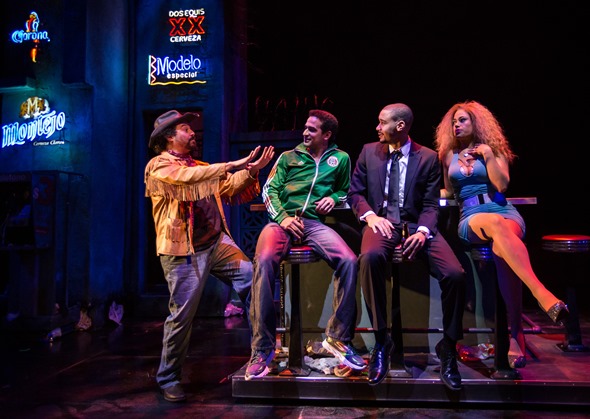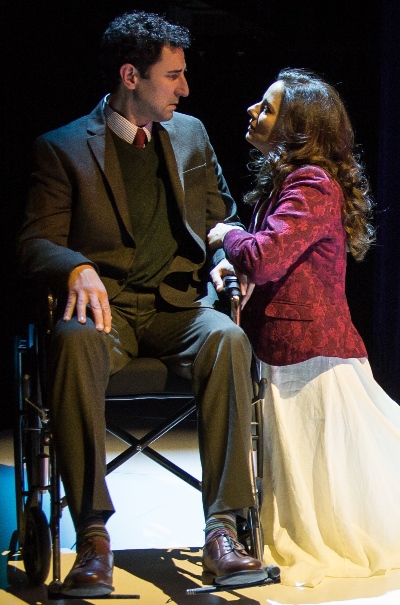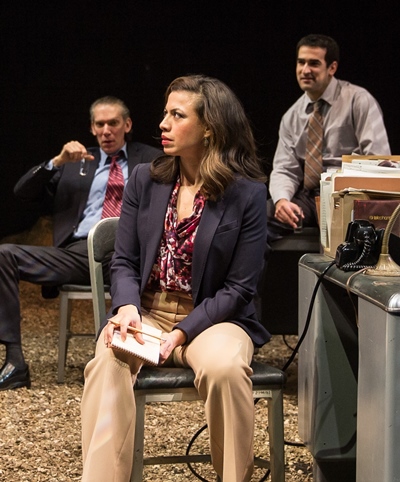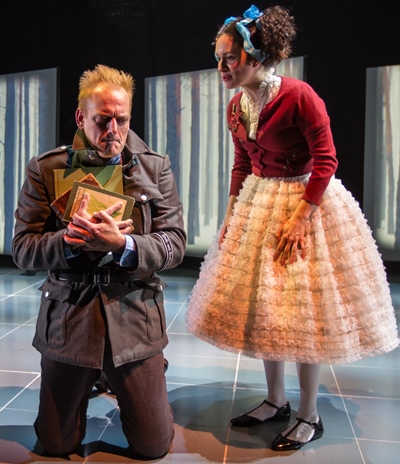‘2666’ at Goodman: Epic saga of lust, murder and other scholarly pursuits in old Mexico
 “2666,” adapted by Robert Falls and Seth Bockley from the novel by Roberto Bolaño, at Goodman Theatre through March 20. ★★★
“2666,” adapted by Robert Falls and Seth Bockley from the novel by Roberto Bolaño, at Goodman Theatre through March 20. ★★★
By Lawrence B. Johnson
After five and a half hours spent watching the dramatic evolution of “2666,” the adaptation by Robert Falls and Seth Bockley of Roberto Bolaño’s sprawling novel at the Goodman Theatre, I could think only of that sublimely ironic lyric made famous by Peggy Lee: Is that all there is?
This ambitious enterprise affords a goodly share of rewards along its meandering narrative as a sort of whodunit for intellectuals. But in the end, in its totality, “2666” as theater is a shaggy-dog story of St. Bernard proportions.
 Actually, to amend what I just said, the tale is a mass-murder mystery about intellectuals. In the present time, four European literary scholars, one wheelchair-bound plus two insatiably randy chaps and a complaisant female colleague, set out on a quest to locate an enigmatic literary sensation called Benno von Archimboldi. His trail leads them ultimately to the fictional Mexican town of Santa Teresa, a stand-in for the actual city of Ciudad Juárez, the locale of a historical (and continuing) murder mystery on a vast scale – the slaying of hundreds of young women whose mutilated bodies have turned up mostly in the surrounding desert.
Actually, to amend what I just said, the tale is a mass-murder mystery about intellectuals. In the present time, four European literary scholars, one wheelchair-bound plus two insatiably randy chaps and a complaisant female colleague, set out on a quest to locate an enigmatic literary sensation called Benno von Archimboldi. His trail leads them ultimately to the fictional Mexican town of Santa Teresa, a stand-in for the actual city of Ciudad Juárez, the locale of a historical (and continuing) murder mystery on a vast scale – the slaying of hundreds of young women whose mutilated bodies have turned up mostly in the surrounding desert.
As the sleuths progress from place to place, the story line shifts back and forth across time, revealing the origins of the celebrated but elusive writer these scholars wish so ardently to meet. To make the epic more trackable, it is divided into five parts, starting with an introduction to the scholars, who as participants in a conference on their new favorite subject display both their academic zeal and, in often hilarious fashion, their human frailties.
Thanks to smart, crisp direction (Falls and Bockley collaborated in this respect, as well), the setup chapter whets the appetite for what promises to be a rollicking saga. It also displays what will prove to be a close and purposeful union of Walt Spangler’s imaginative set designs and Aaron Spivey’s subtle lighting schemes. The acting here is auspicious, too, with a range of droll, calculating academics played by Sean Fortunato, Lawrence Grimm, Demetrios Troy and Nicole Wiesner.
 This prelude gives way to two lengthy episodes that spin us toward what feels like an extreme periphery of the central story, though in fact these digressions and the main narrative are tightly interlocked. The first excursion introduces Oscar Amalfitano, a middle-aged Spanish émigré (played at an exhausted edge by Henry Godinez) who now dwells in the dangerous world of Santa Teresa with his lovely 17-year-old daughter Rosa (the vivacious Alejandra Escalante). Curious, rebellious Rosa serves as the thread that will lead us to a very dark place in this seething city.
This prelude gives way to two lengthy episodes that spin us toward what feels like an extreme periphery of the central story, though in fact these digressions and the main narrative are tightly interlocked. The first excursion introduces Oscar Amalfitano, a middle-aged Spanish émigré (played at an exhausted edge by Henry Godinez) who now dwells in the dangerous world of Santa Teresa with his lovely 17-year-old daughter Rosa (the vivacious Alejandra Escalante). Curious, rebellious Rosa serves as the thread that will lead us to a very dark place in this seething city.
Which brings me to the story’s second digression from the hunt for Benno von Archimboldi: the arrival in this forlorn town of Oscar Fate, an African-American reporter for a small Harlem magazine. Oscar (played by Eric Lynch with an appealing mix of moral strength and everyman’s vulnerability) is a political writer inconveniently assigned to cover a boxing match. While he’s wondering how he got this bizarre gig, he stumbles onto Rosa amid her dubious friends and finds himself caught up in the mass murder case.
 Here the Falls-Bockley staging takes a problematic turn. The post-fight party moves to a bordello, where Rosa finds herself in peril and Oscar resolves to get her out. To show what a scary place this is, the adaptors turn to video. It’s effective. But as this film workaround grows longer and longer, you become aware that the challenges and special qualities of live theater have been abandoned: You’re now watching a movie. The thought “cop-out” occurs.
Here the Falls-Bockley staging takes a problematic turn. The post-fight party moves to a bordello, where Rosa finds herself in peril and Oscar resolves to get her out. To show what a scary place this is, the adaptors turn to video. It’s effective. But as this film workaround grows longer and longer, you become aware that the challenges and special qualities of live theater have been abandoned: You’re now watching a movie. The thought “cop-out” occurs.
The fourth of the story’s five large tracts focuses on the infamous unsolved murders of young women, as well as rampant corruption – and pervasive misogyny — in the local police department and the danger to anyone, even legislators, who venture too close to the truth. A recitation of names of the dead, offered by various actors in a large cast, embroiders this grisly episode. Perhaps in a Jungian metaphor for the intellectual-bestial duality in us all, the three male actors who portray scholars looking for Archimboldi also play very bad cops.
 Over the play’s last hour, in its fifth stanza, the secret of Benno von Archimboldi (an unsuspected genius with a fetchingly laconic disposition as portrayed by Mark L. Montgomery) is revealed. While it appears that our doughty band of scholars may never catch up to theit quarry, there is a still greater uncertainty left hanging at the end.
Over the play’s last hour, in its fifth stanza, the secret of Benno von Archimboldi (an unsuspected genius with a fetchingly laconic disposition as portrayed by Mark L. Montgomery) is revealed. While it appears that our doughty band of scholars may never catch up to theit quarry, there is a still greater uncertainty left hanging at the end.
It concerns the elusive Archimboldi and a mission he has agreed to undertake on behalf of his sister. A mission to a small, notorious town in Mexico. The outcome of that undertaking would seem to matter, but such literal detail must have been beside the point to Roberto Bolaño. And enthusiastic critics of the novel have not quibbled about it. But on the stage, in what feels like a long night’s journey into day, “2666” – this elaborate web of stories within stories – ends as if in mid-thought: like the effect might be in Wagner’s arching “Twilight of the Gods” if the opera stopped short of Brünnhilde’s immolation scene.
Just imagine the deposed Valkyrie mounted on her steed above the raging Rhine, and muttering as the curtain descends: “Is that all there is?”
Related Links:
- Performance location, dates and times: Details at TheatreinChicago.com
- Preview of Goodman Theatre’s complete 2015-16 season: Read it at ChicagOntheAisle.com
Tags: Aaron Spivey, Alejandra Escalante, Demetrios Troy, Eric Lynch, Goodman Theatre, Henry Godinez, Lawrence Grimm, Mark L. Montgomery, Nicole Wiesner, Robert Falls, Roberto Bolaño, Sean Fortunato, Seth Bockley, Walt Spangler

